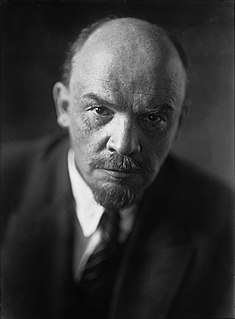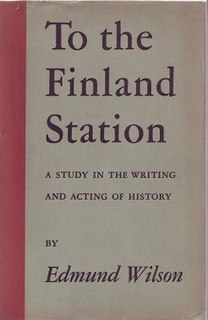Related Research Articles

Lev Davidovich Bronstein, better known as Leon Trotsky, was a Ukrainian-Russian Marxist revolutionary, political theorist and politician. Ideologically a communist, he developed a variant of Marxism which has become known as Trotskyism.

Leninism is a political ideology developed by Russian Marxist revolutionary Vladimir Lenin that proposes the establishment of the dictatorship of the proletariat led by a revolutionary vanguard party, as the political prelude to the establishment of communism. The function of the Leninist vanguard party is to provide the working classes with the political consciousness and revolutionary leadership necessary to depose capitalism in the Russian Empire (1721–1917). Leninist revolutionary leadership is based upon The Communist Manifesto (1848) identifying the communist party as "the most advanced and resolute section of the working class parties of every country; that section which pushes forward all others." As the vanguard party, the Bolsheviks viewed history through the theoretical framework of dialectical materialism, which sanctioned political commitment to the successful overthrow of capitalism, and then to instituting socialism; and, as the revolutionary national government, to realize the socio-economic transition by all means.
State capitalism is an economic system in which the state undertakes business and commercial economic activity and where the means of production are nationalized as state-owned enterprises. The definition can also include the state dominance of corporatized government agencies or of public companies such as publicly listed corporations in which the state has controlling shares.

Trotskyism is the political ideology and branch of Marxism developed by Ukrainian-Russian revolutionary Leon Trotsky and by some other members of the Left Opposition and Fourth International. Trotsky self-identified as an orthodox Marxist, a revolutionary Marxist, and Bolshevik–Leninist, a follower of Marx, Engels, and of 3L: Lenin, Karl Liebknecht, Rosa Luxemburg. He supported founding a vanguard party of the proletariat, proletarian internationalism, and a dictatorship of the proletariat based on working class self-emancipation and mass democracy. Trotskyists are critical of Stalinism as they oppose Joseph Stalin's theory of socialism in one country in favor of Trotsky's theory of permanent revolution. Trotskyists also criticize the bureaucracy that developed in the Soviet Union under Stalin.
The Revolutionary Socialist League (RSL) was a Trotskyist group in the United States established circa 1972 and disbanded 1989.

To the Finland Station: A Study in the Writing and Acting of History (1940) is a book by American critic and historian Edmund Wilson. The work presents the history of revolutionary thought and the birth of socialism, from the French Revolution through the collaboration of Marx and Engels to the arrival of Lenin at the Finlyandsky Rail Terminal in St. Petersburg in 1917.

Ten Days That Shook the World (1919) is a book by the American journalist and socialist John Reed. Here, Reed presented a firsthand account of the 1917 Russian October Revolution. Reed followed many of the most prominent Bolsheviks closely during his time in Russia.
The Socialist Organisation of Working People is a Trotskyist political group in the Czech Republic established in 1998 after a split in the group affiliate to the International Socialist Tendency, Socialist Solidarity.. It is a section of the League for the Fifth International.
Permanent Revolution was a Trotskyist group formed in July 2006 by expelled members of the League for the Fifth International (L5I). It took its name from Leon Trotsky's theory of permanent revolution. The group dissolved itself on 28 March 2013.

"The Red Flag" is a socialist song, emphasising the sacrifices and solidarity of the international labour movement. It is the anthem of the British Labour Party, Irish nationalist Social Democratic and Labour Party, and Irish Labour Party. The song is traditionally sung at the close of each party's national conference.

Marxism is a method of socioeconomic analysis that originates in the works of 19th century German philosophers Karl Marx and Friedrich Engels. Marxism analyzes and critiques the development of class society and especially of capitalism as well as the role of class struggles in systemic economic, social and political change. It frames capitalism through a paradigm of exploitation and analyzes class relations and social conflict using a materialist interpretation of historical development - materialist in the sense that the politics and ideas of an epoch are determined by the way in which material production is carried on.
Hal Draper was an American socialist activist and author who played a significant role in the Berkeley, California, Free Speech Movement. He is known for his extensive scholarship on the history and meaning of the thought of Karl Marx.

Tsar to Lenin is a documentary and cinematic record of the Russian Revolution, produced by Herman Axelbank. It premiered on March 6, 1937, at the Filmarte Theatre on Fifty-Eighth Street in New York City. Pioneer American radical Max Eastman (1883-1969) narrates the film. Because of its pro-Trotskyist position, the film was suppressed by the Stalinists of the American Communist Party and was only widely available in a shortened format in the Library of Congress until its re-release in 2012 by the Socialist Equality Party (US), who state that its predecessor, the Workers League, purchased the film from Axelbank in 1978 and organized showings of the film in the intervening period.
Revolutionary socialism is a political philosophy, doctrine and tradition within socialism which stresses the idea that a social revolution is necessary in order to bring about structural changes to society. More specifically, it is the view that revolution is a necessary precondition for a transition from the capitalist mode of production to the socialist mode of production. Revolution is not necessarily defined as a violent insurrection; it is defined as seizure of political power by mass movements of the working class so that the state is directly controlled or abolished by the working class as opposed to the capitalist class and its interests.

In Marxist philosophy, the dictatorship of the proletariat is a state of affairs in which the proletariat holds political power. The dictatorship of the proletariat is the intermediate stage between a capitalist economy and a communist economy, whereby the post-revolutionary state seizes the means of production, compels the implementation of direct elections on behalf of and within the confines of the ruling proletarian state party, and instituting elected delegates into representative workers' councils that nationalise ownership of the means of production from private to collective ownership. During this phase, the administrative organizational structure of the party is to be largely determined by the need for it to govern firmly and wield state power to prevent counterrevolution and to facilitate the transition to a lasting communist society. Other terms commonly used to describe the dictatorship of the proletariat include socialist state, proletarian state, democratic proletarian state, revolutionary dictatorship of the proletariat and democratic dictatorship of the proletariat.
Socialism in one country was a theory put forth by Joseph Stalin and Nikolai Bukharin in 1924, which was eventually adopted by the Soviet Union as state policy.
A socialist state, socialist republic, or socialist country, sometimes referred to as a workers' state or workers' republic, is a sovereign state constitutionally dedicated to the establishment of socialism. The term communist state is often used synonymously in the West specifically when referring to one-party socialist states governed by Marxist–Leninist communist parties, despite these countries being officially socialist states in the process of building socialism. These countries never describe themselves as communist nor as having implemented a communist society. Additionally, a number of countries that are multi-party capitalist states make references to socialism in their constitutions, in most cases alluding to the building of a socialist society, naming socialism, claiming to be a socialist state, or including the term people's republic or socialist republic in their country's full name, although this does not necessarily reflect the structure and development paths of these countries' political and economic systems. Currently, these countries include Algeria, Bangladesh, Guyana, India, Nepal, Nicaragua, Portugal, Sri Lanka and Tanzania.

Permanent revolution is the strategy of a revolutionary class pursuing its own interests independently and without compromise or alliance with opposing sections of society. As a term within Marxist theory, it was first coined by Karl Marx and Friedrich Engels as early as 1850, but since then it has been used to refer to different concepts by different theorists, most notably Leon Trotsky.
In politics, a martyr is someone who suffers persecution and/or death for advocating, renouncing, refusing to renounce, and/or refusing to advocate a political belief or cause.
References
- Songbook for Revolution, wolvestuck.org.uk
- The dictionary of the Turtle, voiceoftheturtle.org
- The Socialist Songbook, btinternet.com